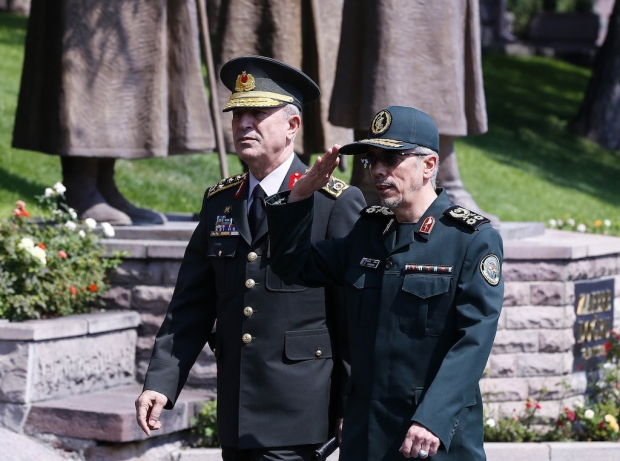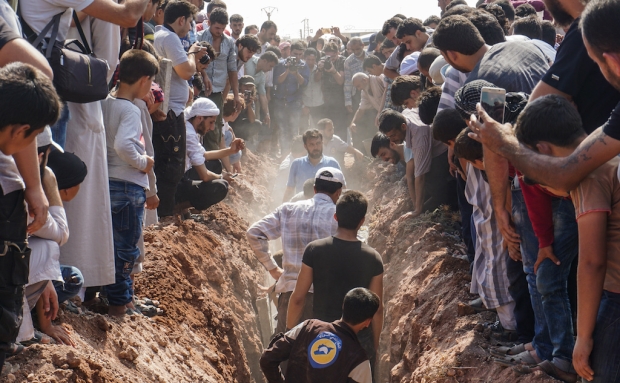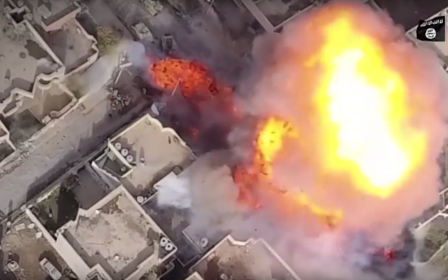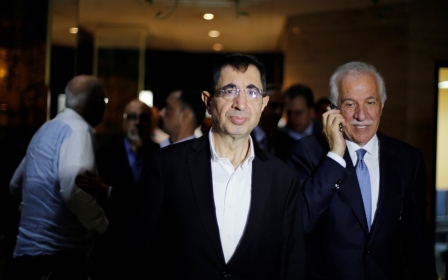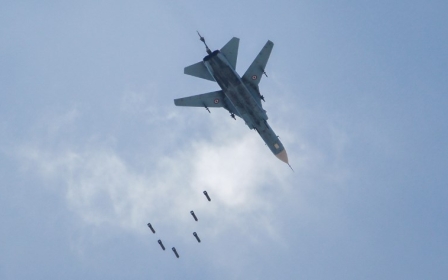ANALYSIS: Ahrar al-Sham's fall hands Syrian rebellion to al-Qaeda
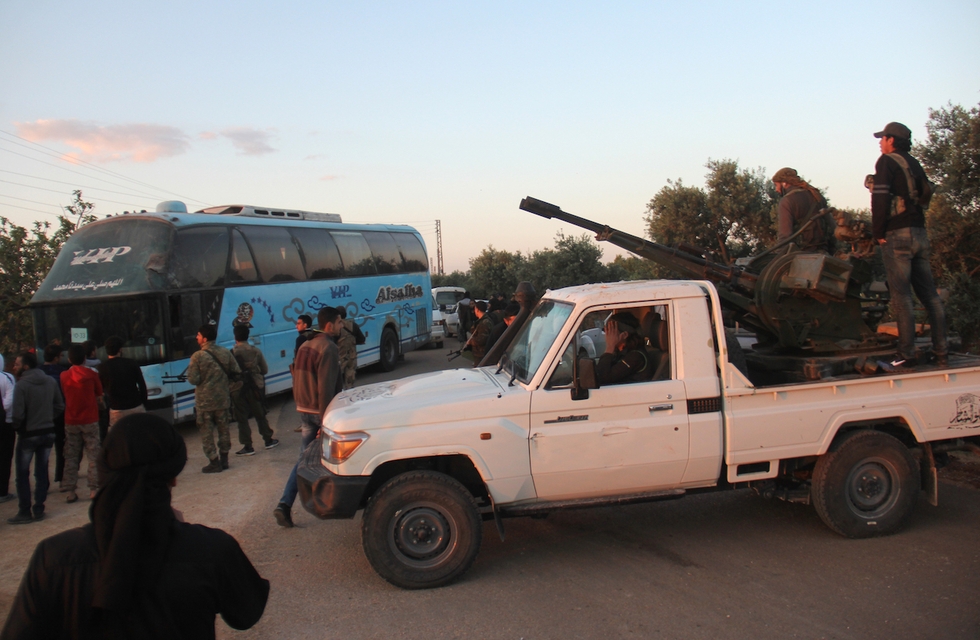
One of the most powerful Syrian opposition groups has largely disintegrated following devastating assaults from former al-Qaeda affiliate Hayat Tahrir al-Sham (HTS), leaving the militant group as the dominant power in rebel-controlled northern Syria.
Idlib province, under the control of rebels since 2015, has seen violent factional fighting between HTS - a coalition dominated by Jabhat Fateh al-Sham, formerly the Nusra Front - and rebel groups allied to Ahrar al-Sham.
Last month HTS captured the Bab al-Hawa crossing between Syria and Turkey, previously one of Ahrar's most important strategic locations and a major source of revenue through border trade.
Ahrar was also driven out of Idlib city, leading some analysts to declare the group defeated militarily.
Governments were already disengaging... these governments now don't see they have any partner to support in Idlib
- Aron Lund, analyst
"HTS are definitely the dominant group now," said Aron Lund, a fellow at the Century Foundation, speaking to Middle East Eye. "I think they were the dominant group before this as well, but they definitely kneecapped Ahrar al-Sham and cleared out all the serious competition at this point."
Michael Stephens, research fellow for Middle East studies at the Royal United Services Institute, said that the takeover was a long time coming. Ahrar al-Sham simply were not able to match HTS on a number of levels.
"HTS was willing to expend more resources, they were better organised, they had more resources to spend, and slowly but surely they've been grinding down the LCCs (opposition council) in the area, pushing out other groups slowly but surely and then able to absorb other groups pretty quickly who realised there was little point in resisting," he told MEE.
"Ahrar al-Sham just really haven't been able to do that."
The seizing of power by HTS has alarmed foreign observers - the group is designated a terrorist group by the US and its control of Idlib could provide serious challenges for aid groups attempting to reach the more than two million civilians still left in the province.
According to Syrian sources quoted in the LA Times, one German NGO which was delivering aid through Bab al-Hawa has already suspended its operations.
A 'lost cause'
Michael Ratney, the US State Department's special envoy to Syria, warned last week that HTS's domination of Idlib, which he described as a "tragedy", would provoke further air strikes on the province.
"It would be very difficult for the US to convince international actors that they should not resort to the necessary military measures if the Nusra Front dominates Idlib," he said in a statement.
"Everyone should know that it is the group of [HTS leader Abu Mohammed] Jolani, who is responsible for the heavy consequences that will arise in Idlib."
Lund said that former international backers of the Syrian opposition now viewed Idlib as a "lost cause" and were, among other things, unlikely to act to prevent Syrian President Bashar al-Assad from attempting to retake the province in future.
"You have a situation where governments that were already disengaging from the Syrian opposition, not fully, but to an extent, like the United States, France... these governments now don't really see that they have any partner to support in Idlib any more," he explained.
"Maybe that point was reached much earlier - but until now most of the pro-opposition nations have sort of reasoned that there's still a point to us supporting all these minor opposition groups, from the FSA factions or even in some cases Ahrar al-Sham.
"That helped balance HTS and the jihadis, it helps deny them some resources, prevents them from being completely in control, and also because it helps the population."
"But the question is, is this line of thinking going to survive the fact that HTS can now direct all of the aid if it wants to?"
There are also indications that Turkey, previously thought of as the strongest backer of opposition forces in northern Syria, has begun to view the rebel presence in neighbouring Idlib as more of a threat than a potential ally.
The Saudi al-Sharq al-Awsat newspaper reported on Thursday that Turkey had begun negotiating with Iran and Russia over challenging HTS.
Turkey, Iran and Russia agreed in May to set up "de-escalation zones" in Syria to try to stem the fighting in some parts of the country, including Idlib. They have also spearheaded talks between opposition and government factions in the Kazakh capital of Astana.
On Tuesday Mohammad Bagheri, the chief of staff of Iran's armed forces, visited his Turkish counterpart Hulusi Akar, in the first meeting of its kind.
Turkey's foreign minister, Mevlet Cavusoglu, also announced on Wednesday that there would also soon be high-level meetings with Russian military officials.
"The negotiations regarding the Idlib issue are still ongoing," Cavusoglu told Turkish broadcaster TRT Haber on Wednesday.
Stephens said Turkey would not be able to leave HTS in control of Idlib in the long term, however.
"The Turks will have to do something about it - the question is, what?" he said.
"They can't really invade and of course they're busy in Afrin at the moment," he said, referring to a region in northwest Syria controlled by the pro-Kurdish People's Protection Units.
"The things that they've got in place at the moment are not sufficient - to be honest, I don't think Turkey's got sufficient plans in place for dealing with Idlib."
New Ahrar leadership
Despite the seemingly terminal setbacks, earlier this week Ahrar al-Sham said it had appointed a new top team.
Ahrar announced it had chosen a new political leader, Kenan al-Nahhas, the brother of the well-known foreign relations chief Labib al-Nahhas, who has previously written articles for the Washington Post among others.
The Nahhas brothers are regarded as closer to the US and Turkey and have been more willing to fly the tricolour flag of the Free Syrian Army as opposed to Islamic symbols.
The group also appointed Hassan Soufan as its general leader.
At the height of its power, Ahrar commanded as many as 20,000 fighters and was regarded by some as the strongest opposition group in Syria, not including the YPG or the Islamic State group, both of which the group clashed with.
Although some founding members of Ahrar al-Sham had direct connections with al-Qaeda, the group had generally attempted to walk a tightrope between the FSA affiliates and the hardline Salafists of HTS.
Fighting alongside then Nusra in the Jaish al-Fatah coalition, the group seized control of Idlib province in 2015, remaining the main opposition stronghold until the present day.
Geneva's the right place - but don't expect an answer any time soon. And I don't think anyone's really done a good assessment of the full strength of HTS and how to address that
- Michael Stephens, Royal United Services Institute
But analysts said that the ideological divide within the group would eventually lead to its irreparable divisions.
"The group has been going through an existential ideological rivalry between two wings: pragmatists and hardliners," wrote Haid Haid, a research fellow at Chatham House.
"Pragmatic cadres want to turn the movement into a more politically accepted Islamist group by distancing themselves from Salafi-jihadi puritanism and increasing cooperation with the West and other Syrian rebel factions."
However, he said that it was possible to view the appointment of Soufan as a recognition by the group of its own failings.
"The group's new leader, Hassan Soufan, a charismatic and respected figure who was recently released in a prisoner swap with the Syrian regime, admitted in his first recorded statement that the group's defeat was due to internal dysfunctions and weaknesses rather than the strength of its enemy," he wrote.
"Recognising Ahrar's weaknesses and mistakes is a step in the right direction but only transformative changes will allow the group to stand on its feet again."
Although the situation on the ground remains fluid, the UN's Syria envoy Staffan de Mistura said on Thursday that he hoped to launch "real, substantive" peace talks in October, after the opposition has had time to develop a more pragmatic negotiating strategy.
De Mistura has previously hosted seven rounds of mainly failed talks, with the fate of Assad standing out as a main obstacle to progress.
He said that the opposition required "more time in order to come up (with) a more inclusive and perhaps even a more pragmatic approach".
He told reporters in Geneva that there is "major opportunity for the opposition to take stock of the realities on the ground (and) take stock of their own need to be unified".
Discussions among the opposition factions are ongoing, but there may be a key meeting in the coming weeks where the sides formally reorganise their delegation ahead of face-to-face talks with the Syrian government, de Mistura said.
Stephens said he didn't expect a huge amount of progress from the Geneva talks.
"By all means it should be the forum for any type of international talks or mediation," he told MEE. "And I don't think Astana can be the venue for something like Idlib, and it involves too many western interests for it to be left to Astana.
"Geneva's the right place - but don't expect an answer any time soon. And I don't think anyone's really done a good assessment of the full strength of HTS and what they're doing there and how to address that politically and diplomatically."
New MEE newsletter: Jerusalem Dispatch
Sign up to get the latest insights and analysis on Israel-Palestine, alongside Turkey Unpacked and other MEE newsletters
Middle East Eye delivers independent and unrivalled coverage and analysis of the Middle East, North Africa and beyond. To learn more about republishing this content and the associated fees, please fill out this form. More about MEE can be found here.


